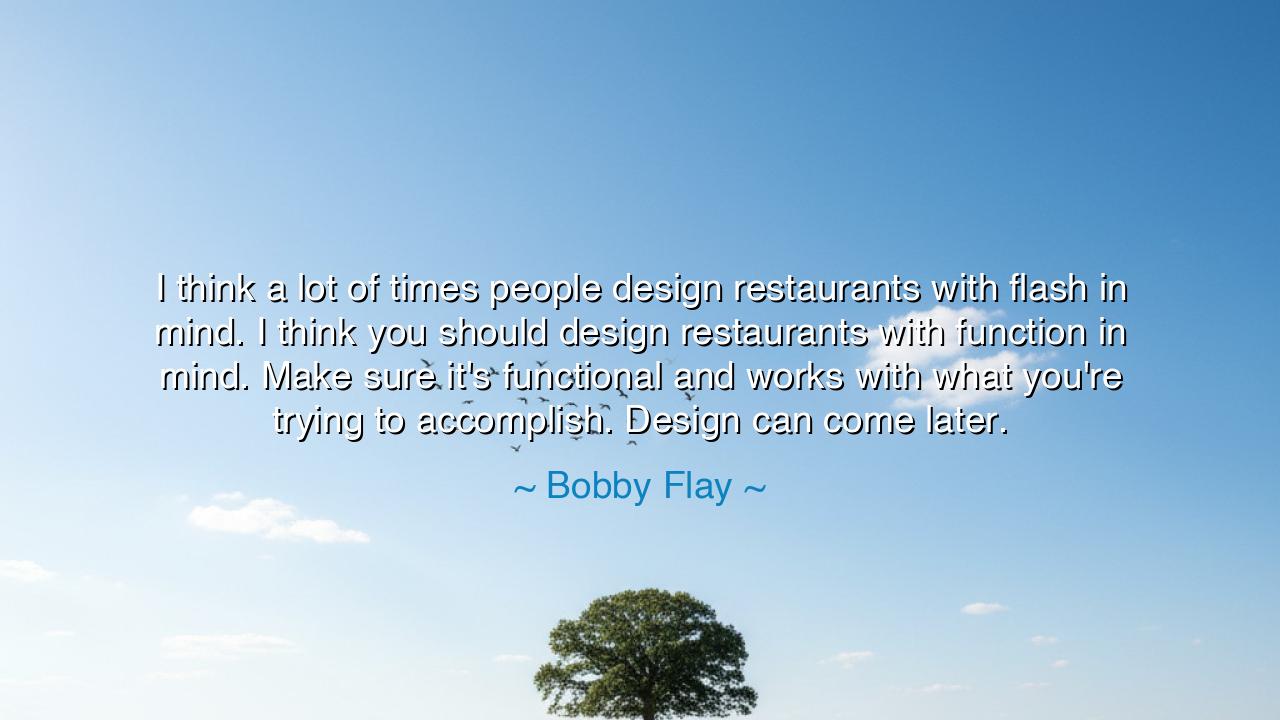
I think a lot of times people design restaurants with flash in
I think a lot of times people design restaurants with flash in mind. I think you should design restaurants with function in mind. Make sure it's functional and works with what you're trying to accomplish. Design can come later.






“I think a lot of times people design restaurants with flash in mind. I think you should design restaurants with function in mind. Make sure it's functional and works with what you're trying to accomplish. Design can come later.” So spoke Bobby Flay, a craftsman of fire and flavor, whose wisdom extends far beyond the kitchen. His words are not about walls and tables alone—they are a lesson for all who build, create, or dream. In them lies an eternal truth: that substance must come before appearance, that purpose is the foundation upon which all beauty must rest. For what use is a splendid palace if its pillars cannot bear the weight of the roof?
In the old days, the sages would say, “First build the bones, then dress them in gold.” The ancients who raised temples and cities knew this law of creation: function precedes form, and order births beauty. Flay’s counsel, though born in the modern halls of culinary art, echoes the same wisdom. The restaurant, to him, is a living organism. Its heartbeat is in the kitchen, its veins in the flow of service, its breath in the warmth of hospitality. To design it merely for “flash,” for the eyes of the passerby, is to craft a body without a soul. It may dazzle for a moment, but soon the hollowness within will echo, and the people will depart.
Consider the story of the ancient Roman builders, who mastered the art of structure. When the Pantheon was raised, they did not begin with marble carvings or gold leaf. They began with mathematics, balance, and purpose—a dome shaped to the heavens, built to last millennia. Beauty was not their first goal, yet beauty became their reward. So too, in the world of the restaurant, or any craft, when one begins with function, harmony arises naturally. The form that follows becomes true and lasting, not hollow and fleeting.
In our age, many chase flash—the shimmer of appearance, the applause of the crowd, the fleeting spark of admiration. Yet these are like fireworks—bright for a moment, then gone into smoke. True greatness, however, is like the hearth fire—it burns steady, warm, and eternal, feeding those who gather near. Bobby Flay teaches that the creator must not seek the admiration of the moment, but the utility of the ages. To serve well, to move gracefully, to make something that works—that is where mastery begins.
Even in art, the lesson holds. Leonardo da Vinci studied anatomy and mechanics before he painted angels. He understood the movement of muscles, the bend of light, the weight of shadow. His function was understanding; his design was the blossom of that root. Without the first, the second would have been an illusion. Thus, every true artist, builder, or leader must begin by asking: What is the purpose? What must this creation accomplish?
So let the builders, the chefs, the dreamers of our time remember: form is the servant of function. The path of wisdom begins not in decoration, but in understanding. Ask yourself not first how a thing looks, but how it lives—how it moves, how it breathes, how it serves. For if it does not work, if it does not fulfill its purpose, then all its beauty is but a painted mask on a crumbling face.
The lesson, then, is this: build your life as you would build a great kitchen. Lay the stones of function first—discipline, clarity, usefulness, and purpose. Let the design—the beauty, the charm, the sparkle—arise naturally from what you have made true. Do not chase shine before substance; do not confuse attention with achievement. In all that you create, whether it is a home, a career, a dream, or a life—make sure it works. Then, and only then, adorn it with light.
For the wise know that true beauty is born from function fulfilled. And when your work stands firm, when it feeds both the body and the soul, the world will see its beauty—unforced, undeniable, and everlasting.






AAdministratorAdministrator
Welcome, honored guests. Please leave a comment, we will respond soon